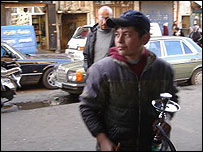 By Mike Sergeant, Their faces are covered in dirt. Their hands are tough and grimy. Their eyes have been hardened by years of adult labour. Lebanon’s child workers lost their playfulness a long time ago. According to some estimates, up to 100,000 children – some as young as eight years old – work in Lebanon. The problem is getting worse because of the long-running political crisis in the country, and growing economic uncertainty here. Stroll down some of the inner city streets in Tripoli and you can see young boys sawing, painting, hammering and welding. During what should be school time, there are children hard at work in almost every workshop, garage and cafe.
By Mike Sergeant, Their faces are covered in dirt. Their hands are tough and grimy. Their eyes have been hardened by years of adult labour. Lebanon’s child workers lost their playfulness a long time ago. According to some estimates, up to 100,000 children – some as young as eight years old – work in Lebanon. The problem is getting worse because of the long-running political crisis in the country, and growing economic uncertainty here. Stroll down some of the inner city streets in Tripoli and you can see young boys sawing, painting, hammering and welding. During what should be school time, there are children hard at work in almost every workshop, garage and cafe.
Necessity: Mahmoud, 14, lives in a world of machines, tools and dirt and spends his days cutting wood and making furniture. He tells me he last went to school three years ago. Studying is no longer an option. His family needs the money, so he puts in 12-hour shifts for couple of dollars a day. Lebanon signed an international convention in 2001 which included a series of measures to curb the worst forms of child labour. But – due to total political deadlock here – nothing has been implemented. The children don’t complain about their situation. For many, school was just a brief interlude before the real business of life began. Some say they are still ambitious to become doctors, lawyers or bankers. Few seem to realise those avenues are probably already closed.
No protection
The children work because their families are poor and the government-funded schools are inadequate, according to many parents.
 Mohammed
|
Mahmoud Issa, the father of Abdul Rahman – a 14-year-old car mechanic – says: "My son is not very clever. I have six children. I can’t afford to send them to private schools and the state schools don’t care about the students."
Most of the children work unsupervised. Some wield potentially lethal tools and machines with no protective clothing at all.
"Yes it’s dangerous," says Mohammed, 12, who breaks up car parts for a living, "If I don’t do it properly I can easily get injured."
Iman Nuwayhid, a professor at the American University in Beirut, says many children risk developing serious health problems because of their exposure to toxic chemicals.
"We concluded that the chemicals might be affecting their nervous systems. When you ask the children to do certain tests – on their dexterity, their memory, their concentration – we find that these things are being affected."
Sexual abuse is another common problem, say some observers.
And when these child labourers grow into poorly-educated adults in dead-end jobs, they’ll also be the most likely to end up on the frontline of any future battles, in this country scarred by regional and civil conflict.
That’s the view of Nayla Mouawad, minister for social affairs who is also a vocal critic of Islamic militant groups in the country. She says youngsters out of school are the most fertile ground for recruitment by such groups.
"Any movement, any ideology can take advantage of them," she says.



